Related Research Articles

Sir Francis Galton was a British polymath and the originator of the behavioral genetics movement during the Victorian era.

Jeeves is a fictional character in a series of comedic short stories and novels by English author P. G. Wodehouse. Jeeves is the highly competent valet of a wealthy and idle young Londoner named Bertie Wooster. First appearing in print in 1915, Jeeves continued to feature in Wodehouse's work until his last completed novel Aunts Aren't Gentlemen in 1974, a span of 60 years.

Agatha Gregson, née Wooster, later Lady Worplesdon, is a recurring fictional character in the Jeeves stories of the British comic writer P. G. Wodehouse, being best known as Bertie Wooster's Aunt Agatha. Haughty and overbearing, Aunt Agatha wants Bertie to marry a wife she finds suitable, though she never manages to get Bertie married, thanks to Jeeves's interference.

Bertram Wilberforce Wooster is a fictional character in the comedic Jeeves stories created by British author P. G. Wodehouse. An amiable English gentleman and one of the "idle rich", Bertie appears alongside his valet, Jeeves, whose intelligence manages to save Bertie or one of his friends from numerous awkward situations. Bertie Wooster and Jeeves have been described as "one of the great comic double-acts of all time".
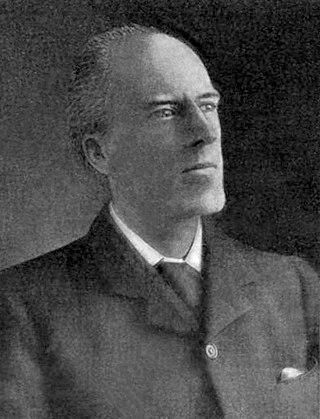
Karl Pearson was an English eugenicist, mathematician, and biostatistician. He has been credited with establishing the discipline of mathematical statistics. He founded the world's first university statistics department at University College London in 1911, and contributed significantly to the field of biometrics and meteorology. Pearson was also a proponent of Social Darwinism and eugenics, and his thought is an example of what is today described as scientific racism. Pearson was a protégé and biographer of Sir Francis Galton. He edited and completed both William Kingdon Clifford's Common Sense of the Exact Sciences (1885) and Isaac Todhunter's History of the Theory of Elasticity, Vol. 1 (1886–1893) and Vol. 2 (1893), following their deaths.
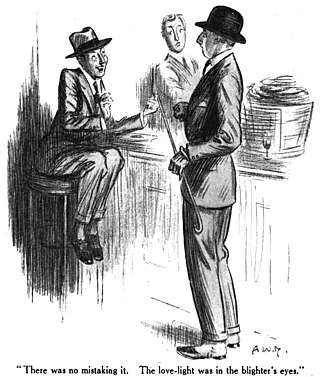
Richard P. "Bingo" Little is a recurring fictional character in the comedic Jeeves and Drones Club stories of English writer P. G. Wodehouse, being a friend of Jeeves's master Bertie Wooster and a member of the Drones Club.
Rosie M. Banks is a recurring fictional character in the Jeeves and Drones Club stories of British author P. G. Wodehouse, being a romance novelist and the wife of Bingo Little.

Honoria Glossop is a recurring fictional character in the Jeeves stories by English comic writer P. G. Wodehouse. Athletic as well as scholarly, she is a formidable young lady and one of the women whom Bertie Wooster reluctantly becomes engaged to.

The Inimitable Jeeves by P. G. Wodehouse was the first of the Jeeves novels, although not originally conceived as a single narrative, being assembled from a number of short stories featuring the same characters. The book was first published in the United Kingdom by Herbert Jenkins, London, on 17 May 1923 and in the United States by George H. Doran, New York, on 28 September 1923, under the title Jeeves.
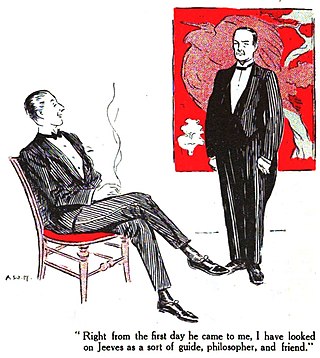
"Jeeves in the Springtime" is a short story by P. G. Wodehouse, and features the young gentleman Bertie Wooster and his valet Jeeves. The story was published in The Strand Magazine in December 1921 in London, and in Cosmopolitan in New York that same month. The story was also included in the 1923 collection The Inimitable Jeeves as two separate chapters, "Jeeves Exerts the Old Cerebellum" and "No Wedding Bells for Bingo".

"The Great Sermon Handicap" is a short story by P. G. Wodehouse, and features the young gentleman Bertie Wooster and his valet Jeeves. The story was published in The Strand Magazine in London in June 1922, and then in Cosmopolitan in New York that same month. The story was also included in the collection The Inimitable Jeeves as two separate stories.
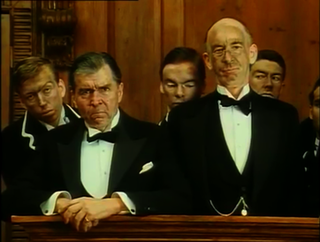
Sir Roderick Glossop is a recurring fictional character in the comic novels and short stories of P. G. Wodehouse. Sometimes referred to as a "nerve specialist" or a "loony doctor", he is a prominent practitioner of psychiatry in Wodehouse's works, appearing in several Jeeves stories and in one Blandings Castle story.
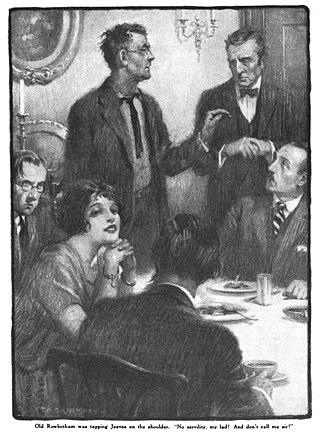
"Comrade Bingo" is a short story by P. G. Wodehouse, and features the young gentleman Bertie Wooster and his valet Jeeves. The story was published in The Strand Magazine in London in May 1922, and in Cosmopolitan in New York that same month. The story was also included in the 1923 collection The Inimitable Jeeves as two separate chapters, "Comrade Bingo" and "Bingo Has a Bad Goodwood".

The A-level is a subject-based qualification conferred as part of the General Certificate of Education, as well as a school leaving qualification offered by the educational bodies in the United Kingdom and the educational authorities of British Crown dependencies to students completing secondary or pre-university education. They were introduced in England and Wales in 1951 to replace the Higher School Certificate. The A-level permits students to have potential access to a chosen university they applied to with UCAS points. They could be accepted into it should they meet the requirements of the university.

"Scoring off Jeeves" is a short story by P. G. Wodehouse, that features a young gentleman Bertie Wooster and his valet Jeeves. The story was published in The Strand Magazine in London in February 1922, and then in Cosmopolitan in New York in March 1922. The story was also included in the 1923 collection The Inimitable Jeeves as two separate chapters, "The Pride of the Woosters Is Wounded" and "The Hero's Reward".

"Sir Roderick Comes to Lunch" is a short story by P. G. Wodehouse, and features the young gentleman Bertie Wooster and his valet Jeeves. The story was published in The Strand Magazine in London in March 1922, and then in Cosmopolitan in New York in April 1922. The story was also included in the 1923 collection The Inimitable Jeeves as two separate chapters, "Introducing Claude and Eustace" and "Sir Roderick Comes to Lunch".

"The Metropolitan Touch" is a short story by English writer P. G. Wodehouse, and features the young gentleman Bertie Wooster and his valet Jeeves. The story was published in The Strand Magazine in London in September 1922, and then in Cosmopolitan in New York that same month. The story was also included in the 1923 collection The Inimitable Jeeves.

"Bingo and the Little Woman" is a short story by P. G. Wodehouse, and features the young gentleman Bertie Wooster and his valet Jeeves. The story was published in The Strand Magazine in London in November 1922, and then in Cosmopolitan in New York in December 1922. The story was also included in the collection The Inimitable Jeeves as two separate stories, "Bingo and the Little Woman" and "All's Well".

"The Purity of the Turf" is a short story by P. G. Wodehouse, and features the young gentleman Bertie Wooster and his valet Jeeves. The story was published in The Strand Magazine in London in July 1922, and in Cosmopolitan in New York that same month. The story was also included in the 1923 collection The Inimitable Jeeves.
References
- ↑ "Bibliography & Glossary". Oxford College Archives. Oxford Archivists’ Consortium. Retrieved 5 March 2009.
- ↑ John Henry Newman, (eds. Ker and Gornall), Letters and Diaries, vol. I, pp.53 & 54
- ↑ P. G. Wodehouse, The Inimitable Jeeves, Chapter 13. The Great Sermon Handicap
- ↑ Dean, Mildred (1928). "The Oxford 'Smalls' and Some Other Matters". The Classical Weekly. 22 (8): 58–60. doi:10.2307/4389223. JSTOR 4389223.
- ↑ Dictionary of Phrase and Fable, E. Cobham Brewer, 1894
- ↑ "galton.org".
- ↑ "A History of Trinity College" (PDF).
- ↑ "Cutting A Rug At The Castle Leslie Club 1966".